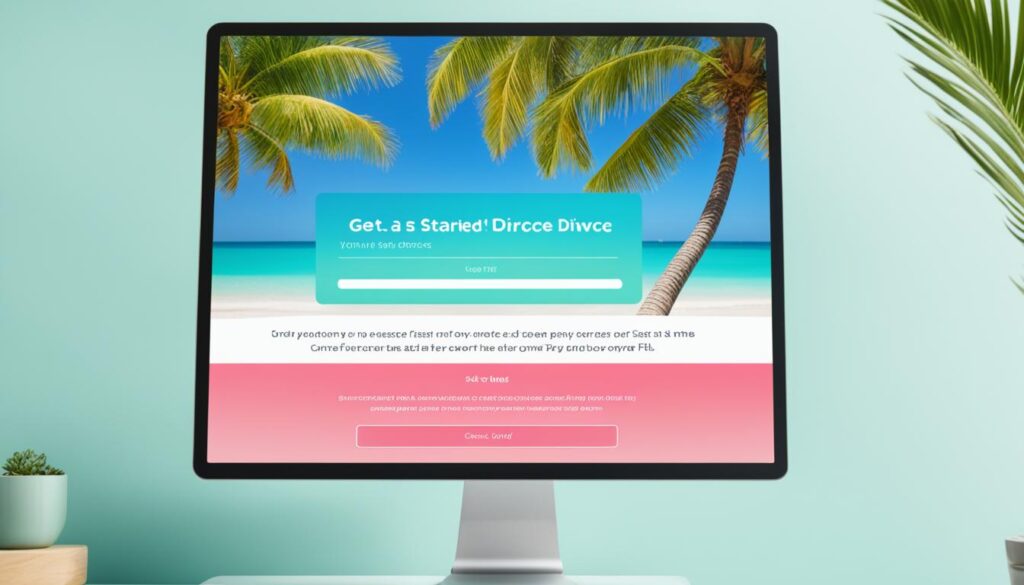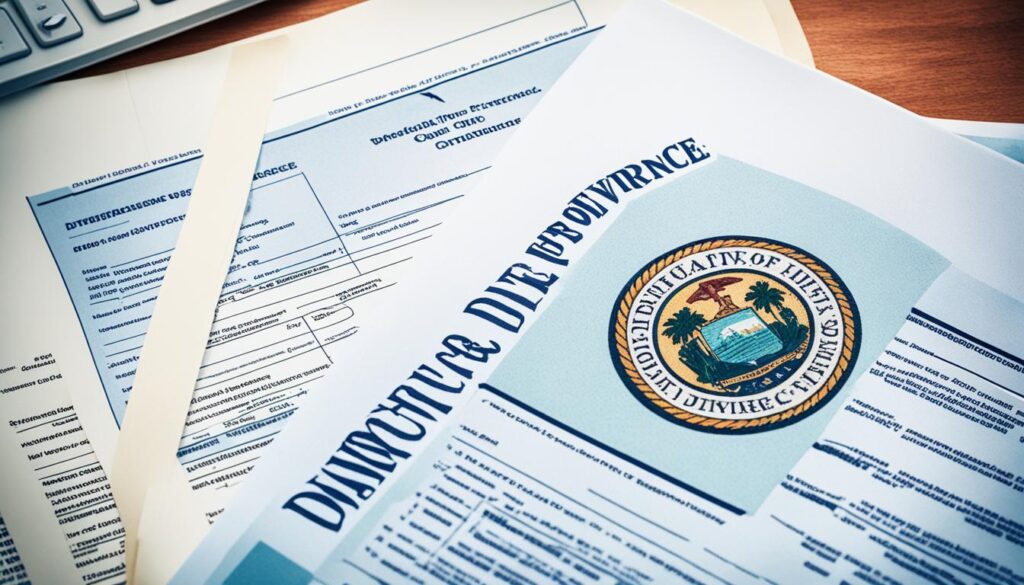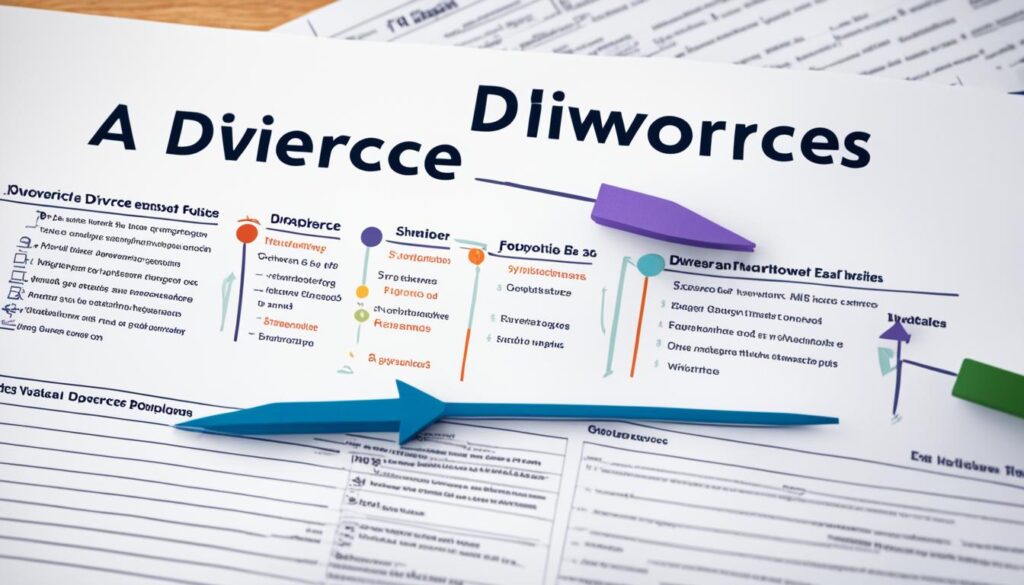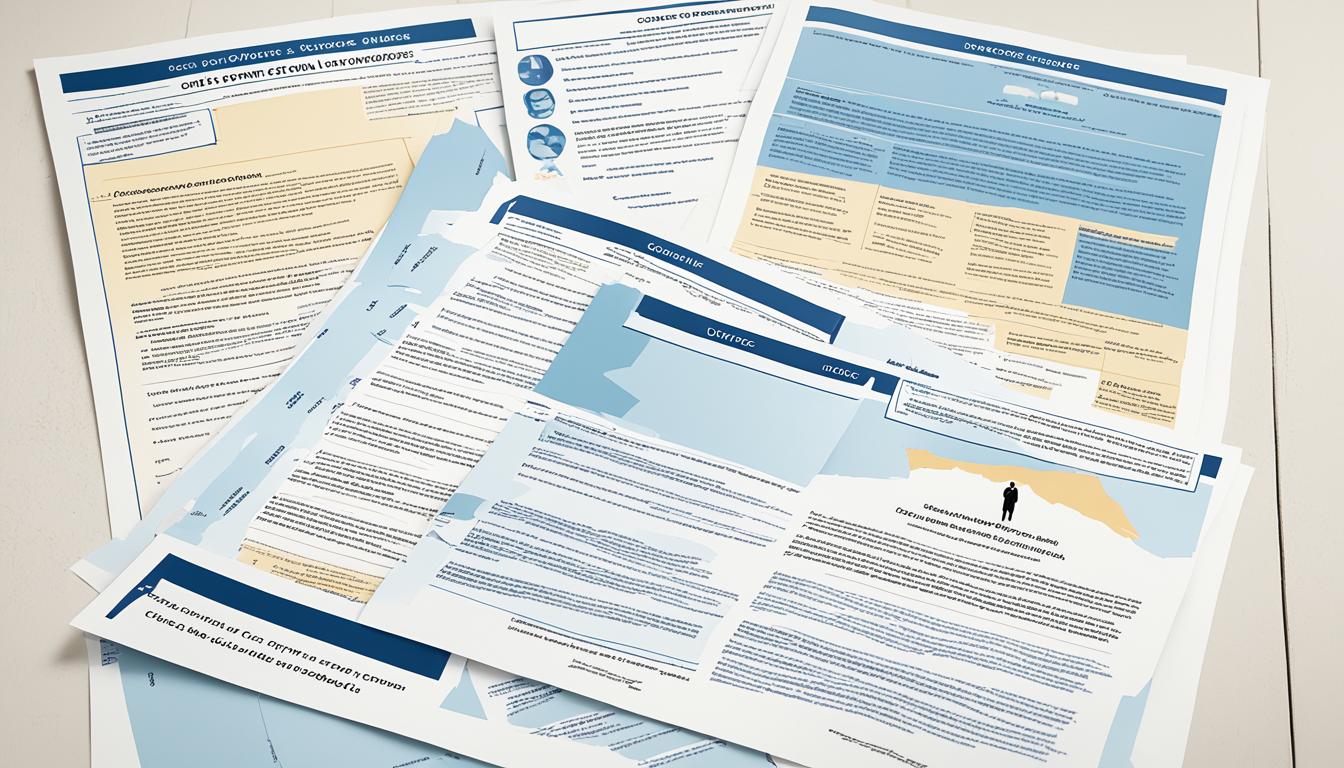Did you realize that more than half of marriages in Florida result in divorce? Dealing with a divorce can be challenging, emotional, and time-consuming. However, there is a faster and simpler method to conclude your marriage. Fast Florida Divorce provides a speedy and affordable solution for couples seeking an uncontested divorce in Florida.
Fast Florida Divorce has an easy online platform. You can do the whole divorce process from home. In just a few clicks, you can get all necessary documents ready, checked by an online lawyer, signed digitally, and filed with the court.
Why spend months and lots of money on a regular divorce? You can get a fast and easy online divorce in Florida. Let Fast Florida Divorce guide you. Start your new chapter easily.
Key Takeaways:
- Fast Florida Divorce offers a quick and easy online way to get a divorce in Florida.
- The service includes making documents, remote online notary, and filing with the court online.
- An online lawyer reviews your info and prepares all needed documents for your situation and agreements.
- The cost is a flat fee of $195, plus extra fees for digital signing, online notary, and court filing online.
- With Fast Florida Divorce, you can finish the whole divorce process quickly and easily from your home.
Why Choose Fast Florida Divorce?
Looking for an online divorce in Florida? Fast Florida Divorce is your best choice. Unlike others, we don’t just draft documents. We make sure they’re complete and correct.
The Benefits of Fast Florida Divorce:
- Thorough Document Preparation: We prepare all needed divorce forms, including the Final Decree. This means your divorce will go smoothly.
- Convenience and Accessibility: Services are online, making things easy for you. Sign and notarize documents online. Plus, we help with electronic filing.
- Legal Expertise: An online attorney checks your info. They prepare all needed documents for you. This makes sure they’re correct and legal.
Choose us and rest easy knowing professionals handle your divorce. We know Florida divorce laws well. We help you through the process easily.
“Fast Florida Divorce goes above and beyond by providing a comprehensive legal service that ensures the accuracy and completeness of the divorce documents.”
Experience the ease of Fast Florida Divorce. Start your online divorce journey today. Begin moving toward a smooth resolution.
The Benefits of Online Divorce in Florida
Online divorce in Florida makes things easy and fast for couples. They don’t need to go to offices or to court. Fast Florida Divorce’s website helps them fill out needed forms. It covers things like who gets what, debts, and child support.
One big plus of this online service is how it guides couples. They answer easy questions online. This saves time and avoids mistakes. It even does the hard math for child support.
More and more couples choose online divorce each year. It’s easier than traditional ways and saves a lot of stress. Couples can start new chapters of their lives faster and nicer.
Benefits of Online Divorce in Florida:
- Convenience and accessibility, eliminating the need for office or court visits
- Streamlined process through an intuitive online interview
- Accurate and comprehensive completion of separation documents
- Calculation of child support, simplifying complex calculations
- Time-saving solution for couples, facilitating a quicker resolution
- Quicker and more amicable completion of agreed divorces
Online divorce in Florida simplifies the divorce process. With Fast Florida Divorce, couples get a fast divorce. This service reduces stress during divorces.
| Advantages of Online Divorce in Florida | Description |
|---|---|
| Convenience | Eliminates the need for office or court visits |
| Simplicity | Streamlines the divorce process through an intuitive online interview |
| Accuracy | Ensures accurate and comprehensive completion of separation documents |
| Child Support Calculation | Includes a built-in calculator for accurate child support calculations |
| Time-saving | Enables a quicker resolution and minimizes the duration of the divorce process |
| Amicable Resolution | Promotes amicable completion of agreed divorces, facilitating a smoother transition |

Qualifying for a Simplified Dissolution of Marriage
In Florida, a simplified dissolution of marriage offers a fast way to divorce. Couples must meet certain needs to qualify. This helps them skip long court times and makes the divorce faster.
No Children Under 18 or Dependent Children
There can’t be kids under 18 or dependent children for a simplified divorce. Couples must agree on custody and support. This makes the divorce simpler without complex talks.
No Pregnancy or Alimony Involved
For a simplified divorce, there can’t be any pregnancy or alimony. Both must agree no spouse is pregnant. Also, no alimony means no need for those talks.
Residency Requirement
One spouse must have lived in Florida for six months. This makes sure Florida laws apply to the divorce.
Meeting these needs means couples can have a simpler divorce. It’s a quicker and easier way to end a marriage. This way, couples can solve their issues and move on faster.
| Requirement | Description |
|---|---|
| No Children Under 18 or Dependent Children | Both parties must agree that there are no children under 18 or dependent children involved in the marriage. |
| No Pregnancy or Alimony Involved | Both parties should be in agreement that there is no pregnancy or alimony involved in the divorce proceedings. |
| Residency Requirement | At least one party must have resided in Florida for the past six months to meet the state’s jurisdiction requirements. |
A simplified dissolution of marriage is a direct way to divorce. Knowing and following these requirements helps Florida couples start a simple divorce process.

Filing for Divorce in Florida
Filing for divorce in Florida means you need to fill out forms. You can find these forms online. They are easy to get to. It’s very important to fill them out right. Once in court, you can’t change them.
If filling out forms is hard, consider hiring a paralegal. They are less costly than lawyers. A paralegal can help make sure everything is done right.
Both spouses must go to court in Florida. This step checks that all is done legally. The judge looks at the paperwork. Then, they can end the marriage.
If you have kids, you might have to take a special class. It’s run by the Department of Children and Families. The class teaches how to work together as parents.
Benefits of Filing for Divorce Online
Online divorce forms make things faster and easier. They come with instructions. This helps avoid mistakes that can slow things down.
These online forms also let you work at your own speed. You can do it all from home. This saves trips to lawyers or court.
An uncontested divorce means you and your spouse agree on key points. This includes child care and dividing things. It makes the divorce smoother.
Doing your divorce online can save money and time. It’s a good choice for many people wanting to end their marriage in Florida.

Additional Requirements for Divorce with Children
Divorcing with minor children means more steps to consider. An uncontested divorce with kids may take more than 30 days. But, it’s simpler and costs less than a contested divorce. In these situations, it’s vital to put the kids first. Ensure that decisions about child support, custody, and visitation are just and right.
For better co-parenting, a parenting course might be needed. This course is approved by the Department of Children and Families. It offers tips on good parenting through and after the divorce. You’ll learn how to talk better, solve conflicts, and keep a steady home for the kids.

Going to a parenting class helps your kids and shows you care about their happiness. It tells the court you’re working to guard your children’s hearts and minds during this hard time. Doing this can make the divorce go more smoothly for everyone.
“It’s key to think of the kids first in divorces with minor children. A parenting course from the Department of Children and Families can teach and support parents in effective co-parenting.”
A divorce that’s not contested with children needs clear talks between parents. This ensures agreements benefit the kids most. Topics like child support, custody, and visits need to be handled justly and last long. Talking with a mediator or family lawyer can lead to good outcomes for both sides.
Key Points:
- A divorce with minor children might take more than 30 days. Yet, it’s less hard and cheaper than a contested one.
- Always think of the children’s best interests in deals about child support, custody, and visitation.
- Taking a parenting class from the Department of Children and Families is often needed. It ensures good co-parenting and the welfare of the children.
- Clear communication and working together are critical to reach fair and lasting agreements on child-related matters.
Residency Requirement for Divorce in Florida
To file for divorce in Florida, you must live there for six months. One person in the divorce must have been in Florida for six months. This makes sure Florida can handle the divorce.

Understanding the Residency Requirement
If you want a divorce in Florida, you must have lived there for six months. This rule helps Florida courts handle your divorce. It’s part of Florida law.
Being in Florida just for a short time doesn’t count. You must be there without long breaks. Only one person needs to meet this rule.
Why is Residency Requirement Important?
This rule decides if Florida can deal with your divorce. If you live in Florida, your divorce follows Florida’s rules. This is very important.
Why? Because it makes your divorce easier. It makes sure you follow Florida’s laws. You get the right help and protections from Florida.
“The six months rule for divorcing in Florida makes sure Florida can handle it. By doing this, people can use Florida’s good divorce laws and help.”
Qualifying for Divorce in Florida
To get a divorce in Florida, live there for six months first. This is true for every divorce. Then, you can start the divorce with the right papers.
Make sure you’ve lived in Florida for six months before you start. If not, you might have trouble with your divorce.
The Importance of Agreement in Divorce
In a simplified divorce, agreeing on terms is key. This involves decisions on property, debt, and child support. Without agreement, the process gets harder and might need lawyers.
An uncontested agreement makes divorce easier. It saves time, money, and reduces emotional stress.
Divorce settlement agreements:
A critical part is the divorce settlement. It’s a document that splits assets and debts fairly.
“By entering into a divorce settlement, both parties can avoid the uncertainty and potential conflict of leaving these decisions up to a judge.”
The settlement divides real estate, personal items, and financial accounts. It decides on debt responsibility too.
Child-related agreements:
With kids involved, agreements also cover custody and support. This ensures their wellbeing during tough times.
A good agreement considers the family’s needs. It gives everyone a say in the outcome.
The benefits of a mutual divorce agreement:
- Reduces legal costs and expenses associated with litigation
- Minimizes the emotional toll and prolonged conflict
- Promotes cooperation and effective co-parenting, if children are involved
- Expedites the divorce process, leading to a quicker resolution
Communication and compromise help achieve an uncontested agreement. It’s best for the couple and their family.

| Pros | Cons |
|---|---|
| Reduces legal costs and expenses | Potential difficulties in reaching an agreement |
| Promotes effective co-parenting | Requires compromise and cooperation |
| Shortens the duration of the divorce process | May require professional mediation or legal assistance |
The Role of Attorneys in Divorce
In simple divorce cases, you might not need a lawyer. But, if issues get big, you might want help. Divorce attorney assistance means advice and court help from lawyers. They keep your rights safe during the divorce.
If you argue about kids, money, or stuff, a lawyer is key. They handle hard talks and get you good results.
Simple divorces are quick, but may miss complex problems. A lawyer’s help could change the outcome a lot.
Lawyer costs change based on how complex and long your case is. They might charge hourly or a flat rate. It’s good to talk about costs early and know their billing ways.
“Having a lawyer means having someone smart to help. They protect your rights and aim for the best end.”
Skipping a lawyer to save money might seem good, but could cost more later. Divorces are tough and need clear, fair advice. This helps you make good choices for your future.
A lawyer gives:
- Smart advice on divorce rules
- Help with settlements and agreements
- Help in court and mediation
- Help with kid and property issues
With a divorce lawyer, you move through legal steps with hope. They fight for you and what you deserve.
Next, we’ll look at how to do divorce papers and court stuff in simple divorces.
| Table: Pros and Cons of Hiring a Divorce Attorney | |
|---|---|
| Pros | Cons |
| Smart legal advice and help | Extra costs |
| Court help | May cause more arguments |
| Keeps your rights safe | You might lose some control |

Important Considerations When Hiring a Divorce Attorney
Choosing a divorce lawyer is big. Look for one with lots of family law wins. They should really understand divorce cases.
Talking well during a divorce matters. Find a lawyer who hears you, explains well, and keeps you in the loop.
Think about your money too. Lawyers aren’t cheap, but some offer payment plans or different fees to help.
Having a skilled divorce lawyer can make you feel safer. They make sure no one steps on your rights during the divorce.
Completing Divorce Forms
Filling out divorce forms the right way is key for a smooth process. You can get these forms online from the Florida State Courts. They include the Petition for Simplified Dissolution of Marriage among others. These forms lay out the details of the divorce.
When you fill out the forms, focus on getting every detail right. This means personal info, details about children, assets, debts, and any support arrangements. You have to check each part of the form and fill it out carefully.
Handling divorce papers can be tough, especially if it’s your first time. Getting help from a professional might be a good idea in these cases.
The Role of Paralegal Assistance
Paralegals are trained to help with legal stuff, including divorce. They make sure your forms are correct. They include all needed info in the right format.
Paralegals help people understand what they need to do with the forms. They know the legal terms and processes well. This can make the whole divorce thing easier to get through.
Getting help from a paralegal means your forms will be done right. This lowers the chance of mistakes. Also, paralegals are cheaper than lawyers. This is great for those who need help but can’t afford a lawyer.
It’s important to complete your divorce forms right, whether you get help or do it on your own. This helps everything go smoothly. It leads to outcomes that work for everyone.

| Advantages of Completing Divorce Forms Accurately | Role of Paralegal Assistance |
|---|---|
|
|
Court Procedure in a Simplified Divorce
In a simplified divorce, both parties must see a judge in court. The court hearing is a key step to finalize the divorce. The judge checks the paperwork to make sure it follows the law and divorce decree requirements. They might ask simple questions to understand the forms better.
Note: The court hearing is a formal proceeding, and it is crucial for both parties to be prepared and respectful during this process.
When the judge is happy with the documents, they will sign the Final Decree. This paper officially ends the divorce in court. It covers property splitting, kids’ custody, visit times, and any money matters. It’s crucial that both understand and agree to the decree’s terms before it’s signed.
After signing, the Final Decree goes to the circuit clerk. This makes the divorce official in court records. Getting certified copies of this decree is smart. They’re needed for things like ID updates, name changes, or bank details.
Note: The divorce decree is a legally binding document, and it is important to keep it in a safe place to refer to in the future if necessary.
Handling a simplified divorce in court can be tough and stir emotions. It’s key to get legal help if needed. This ensures the law is followed and your interests are looked after.

| Pros | Cons |
|---|---|
| Officially finalizes the divorce | Requires both parties to appear in court |
| Provides legal documentation of the divorce | Can be emotionally challenging |
| Ensures compliance with the law | May require additional time and expenses |
| Helps protect the rights and interests of both parties | Requires understanding and agreement on the terms of the divorce decree |
How Long Does the Divorce Process Take?
In Florida, a simple divorce usually takes about 30 days from start to finish. Yet, how long it really takes can change. This is because of things like how busy the court is and if you need to do extra things, like a parenting class.
To make an uncontested divorce go quickly, both people must agree on everything. This means agreeing on how to split up things, if one person needs financial help from the other, who the kids will live with, and how much money will be given for the kids. Agreeing on these things makes the divorce go faster.
After handing in all the paperwork, the court looks at your case. A judge makes sure everything follows the law in a simple divorce. They might ask questions to understand the forms better.
When the judge says okay, they sign the Final Decree to officially end the marriage. Then, this decree is recorded with the circuit clerk. Both people should keep official copies of the Final Decree.
While a simple divorce normally takes about 30 days, it can be different for everyone. The case’s details, if there are kids, and how busy the court is can change how long it takes.

Understanding the divorce steps and meeting all the needs can make things go faster. It can help to talk to a divorce lawyer or a paralegal. They can guide you through the process.
Costs of Online Divorce in Florida
Looking into an online divorce in Florida means knowing the costs. Costs can change based on the service you choose. You might also pay more for extra services.
Fast Florida Divorce offers a $195 fee for preparing your documents. This cost covers creating all needed documents for you. Yet, you might pay more for digital signing, online notary, and court e-filing.
| Service | Cost |
|---|---|
| Document Preparation | $195 (flat fee) |
| Digital Signing | Additional fee may apply |
| Online Notary Services | Additional fee may apply |
| Court E-filing | Additional fee may apply |
Don’t forget that court filing fees are extra. They differ by county. These fees are set by the court, not by Fast Florida Divorce. Always check with your local court for exact fees.

Conclusion
Online divorce in Florida is simple, cheap, and easy. It means no need to visit offices or courts. Online divorce makes things faster and less stressful.
Fast Florida Divorce helps couples with all the steps. This includes making sure documents are filled out right. Couples can do their divorce fully online thanks to Fast Florida Divorce.
Online divorce makes things simpler and cheaper than the usual way. Couples can agree on important things like property and child support. Fast Florida Divorce has a clear fee of $195 for their help.
Using Fast Florida Divorce is straightforward. It guides couples through giving the right information. This service handles everything, making the whole process smooth.










